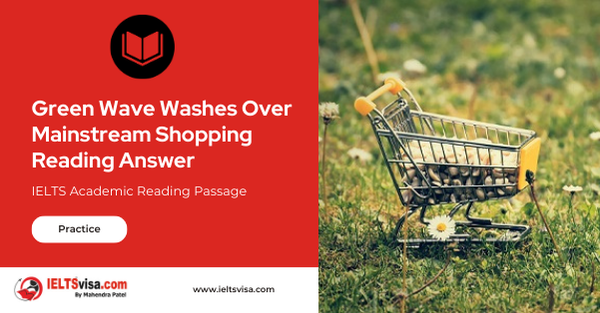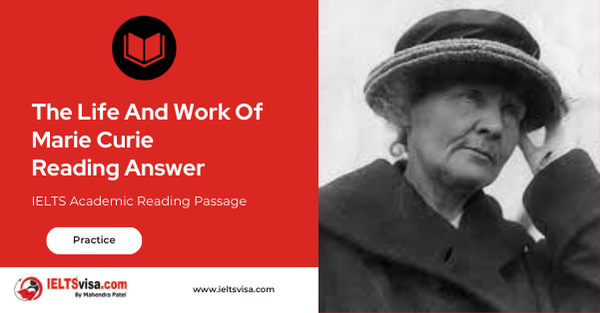Green Wave Washes Over Mainstream Shopping Reading Answer
IELTS Academic Reading Passage
Research in Britain has shown that green consumers’ continue to flourish as a significant group amongst shoppers. This suggests that politicians who claim environmentalism is yesterday’s issue may be seriously misjudging the public mood.
A report from Mintel, the market research organisation, says that despite recession and financial pressures, more people than ever want to buy environmentally friendly products and a ‘green wave’ has swept through consumerism, taking in people previously untouched by environmental concerns. The recently published report also predicts that the process will repeat itself with ‘ethical’ concerns, involving issues such as fair trade with the Third World and the social record of businesses. Companies will have to be more honest and open in response to this mood.
Mintel’s survey, based on nearly 1,000 consumers, found that the proportion who look for green products and are prepared to pay more for them has climbed from 53 per cent in 1990 to around 60 per cent in 1994. On average, they will pay 13 per cent more for such products, although this percentage is higher among women, managerial and professional groups and those aged 35 to 44.
Between 1990 and 1994 the proportion of consumers claiming to be unaware of or unconcerned about green issues fell from 18 to 10 per cent but the number of green spenders among older people and manual workers has risen substantially. Regions such as Scotland have also caught up with the south of England in their environmental concerns. According to Mintel, the image of green consumerism as associated in the past with the more eccentric members of society has virtually disappeared. The consumer research manager for Mintel, Angela Hughes, said it had become firmly established as a mainstream market. She explained that as far as the average person is concerned environmentalism has not gone off the boil’. In fact, it has spread across a much wider range of consumer groups, ages and occupations.
Mintel’s 1994 survey found that 13 per cent of consumers are ‘very dark green’, nearly always buying environmentally friendly products, 28 per cent are ‘dark green’, trying ‘as far as possible’ to buy such products, and 21 per cent are ‘pale green’ – tending to buy green products if they see them. Another 26 per cent are ‘armchair greens’; they said they care about environmental issues but their concern does not affect their spending habits. Only 10 per cent say they do not care about green issues.
Four in ten people are ‘ethical spenders’, buying goods which do not, for example, involve dealings with oppressive regimes. This figure is the same as in 1990, although the number of ‘armchair ethicals’ has risen from 28 to 35 per cent and only 22 per cent say they are unconcerned now, against 30 per cent in 1990. Hughes claims that in the twenty-first century, consumers will be encouraged to think more about the entire history of the products and services they buy, including the policies of the companies that provide them and that this will require a greater degree of honesty with consumers.
Among green consumers, animal testing is the top issue – 48 per cent said they would be deterred from buying a product it if had been tested on animals – followed by concerns regarding irresponsible selling, the ozone layer, river and sea pollution, forest destruction, recycling and factory farming. However, concern for specific issues is lower than in 1990, suggesting that many consumers feel that Government and business have taken on the environmental agenda.
Questions 1-6
Do the following statements agree with the claims of the writer of Reading Passage ?
In boxes 1-6 on your answer sheet write
YES if the statement agrees with the claims of the writer
NO if the statement contradicts the claims of the writer
NOT GIVEN if it is impossible to say what the writer thinks about this
1 The research findings report commercial rather than political trends.
2 Being financially better off has made shoppers more sensitive to buying ‘green’.
3 The majority of shoppers are prepared to pay more for the benefit of the environment according to the research findings.
4 Consumers’ green shopping habits are influenced by Mintel’s findings.
5 Mintel have limited their investigation to professional and managerial groups.
6 Mintel undertakes market surveys on an annual basis.
Questions 7-9
Choose the appropriate letters A-D and write them in boxes 7-9 on your answer sheet.
7. Politicians may have ‘misjudged the public mood’ because …
A they are pre-occupied with the recession and financial problems.
B there is more widespread interest in the environment agenda than they anticipated.
C consumer spending has increased significantly as a result of ‘green’ pressure.
D shoppers are displeased with government policies on a range of issues.
8. What is Mintel?
A an environmentalist group
B a business survey organisation
C an academic research team
D a political organisation
9. A consumer expressing concern for environmental issues without actively supporting such principles is…
A an ‘ethical spender’.
B a ‘very dark green’ spender.
C an ‘armchair green’.
D a ‘pale green’ spender.
Questions 10-13
Complete the summary using words from the box below.
Write your answers in boxes 10-13 on your answer sheet.
NB There are more answers than spaces, so you will not use them all.
The Mintel report suggests that in future companies will be forced to practise greater 10 in their dealings because of the increased awareness amongst 11 of ethical issues. This prediction is supported by the growth in the number of12 identified in the most recent survey published. As a consequence, it is felt that companies will have to think more carefully about their 13
environmental research armchair ethicals
honesty and openness environmentalists
ethical spenders consumers
politicians political belief social awareness
financial constraints social record

Solution for: Green Wave Washes Over Mainstream Shopping Reading Answer
| 1. YES | 8. B |
| 2. NO | 9. C |
| 3. YES | 10. honesty and openness |
| 4. NOT GIVEN | 11. consumers |
| 5. NO | 12. armchair ethicals |
| 6. NOT GIVEN | 13. social record |
| 7. B |
Review and Practice
- Regularly practice with IELTS reading samples and time yourself to get used to the pressure of the exam.
- Review your mistakes to understand where you went wrong and how to avoid similar errors in the future.
Our Books
Master IELTS Speaking Part 1
IELTS Writing Task 1 Book
IELTS Writing Task 2 Book
Green Wave Washes Over Mainstream Shopping Reading Answer Explanation
Comin Soon
Practice IELTS Other Modules
IELTS Listening
The IELTS Listening test assesses how well you can understand spoken English in various contexts. It lasts about 30 minutes and is divided into four sections with a total of 40 questions. The listening tasks become increasingly difficult as the test progresses.
IELTS Academic Reading
The IELTS Academic Reading section assesses your ability to understand and interpret a variety of texts in academic settings. It is designed to evaluate a range of reading skills, including skimming for gist, reading for main ideas, reading for detail, understanding inferences, and recognizing a writer's opinions and arguments.
IELTS Speaking
The IELTS Speaking test assesses your ability to communicate in English on everyday topics. It lasts 11-14 minutes and consists of three parts: introduction, cue card, and a discussion based on the cue card topic.
IELTS General Reading
IELTS General Reading tests your ability to understand and interpret various types of texts. Here are some key areas and types of content you can expect to encounter in the reading section, along with tips for effective preparation.
IELTS Academic Writing Task 1
In IELTS Academic Writing Task 1, you are presented with a visual representation of information, such as graphs, charts, tables, or diagrams, and you are required to summarize, compare, or explain the data in your own words.
IELTS General Writing Task 1
In IELTS General Writing Task 1, you are required to write a letter based on a given situation. The letter can be formal, semi-formal, or informal, depending on the prompt. Here’s a breakdown of the key components to include in your letter
IELTS Academic Writing Task 2
In IELTS Academic Writing Task 2, you are required to write an essay in response to a question or topic. Here’s a guide to help you understand the essential elements of this task
IELTS Exam Tips
To succeed in the IELTS exam, practice regularly, familiarize yourself with the test format, improve your vocabulary, develop time management skills, and take mock tests to build confidence.
Grammer for IELTS
Grammar is the foundation of effective communication in English. Understanding tense usage, subject-verb agreement, and sentence structure enhances clarity and coherence in writing and speaking.
Vocabulary for IELTS
Vocabulary plays a crucial role in the IELTS (International English Language Testing System) exam, especially in the Speaking and Writing sections. Here’s an overview of why vocabulary is important and how it impacts your performance
RECENT IELTS SAMPLES QUESTIONS AND ANSWERS
The Life And work Of Marie Curie Reading Answer
Marie Curie is probably the most famous woman scientist who has ever lived. Born Maria...
Becoming An Expert Reading Answer
A Expertise is commitment coupled with creativity. Specifically, it is the commitment of...
STUDY CENTRE COURSES Reading Answer
SELF-STUDY TIPS AHowever difficult you find it to arrange your time, it will pay off in the...
The Extrinct Grass In Britain Reading Answer
A The British grass interrupted brome was said to be extinct, just like the Dodo. Called...
Morse Code Reading Answer
A. A new satellite-based system is being implemented to replace Morse code for sending...
Magnetic Therapy Reading Answer
AMagnetic therapy, which is a $5-billion market worldwide, is a form of alternative medicine...













